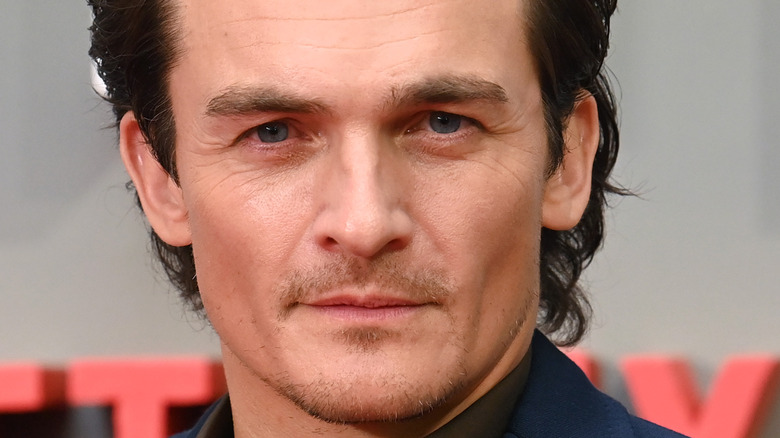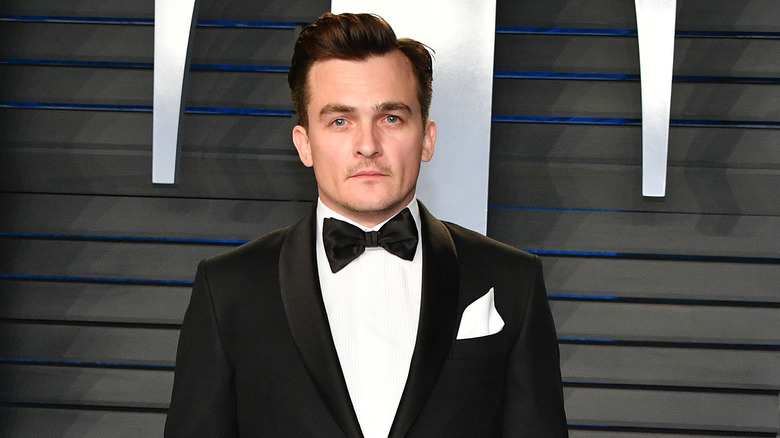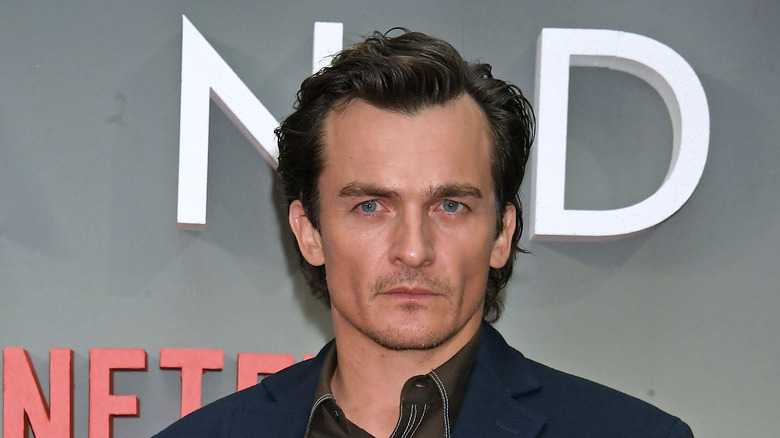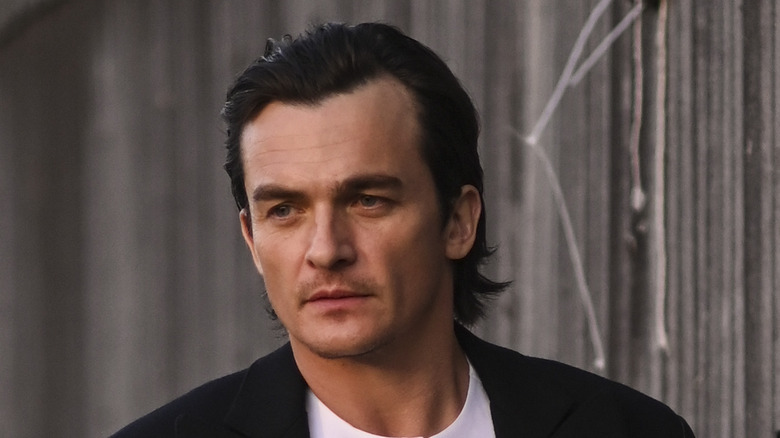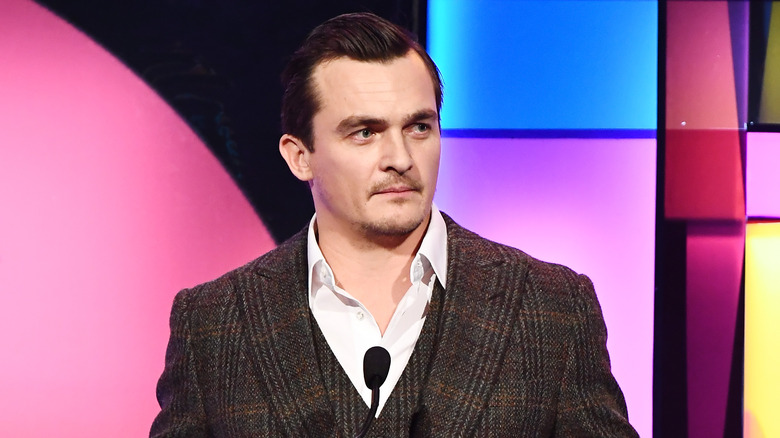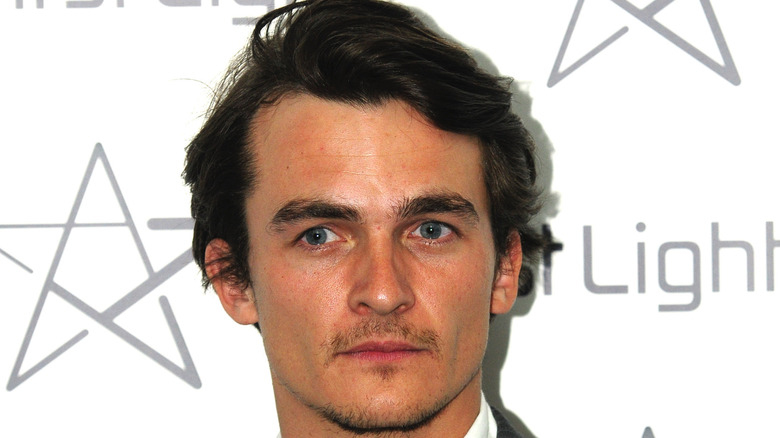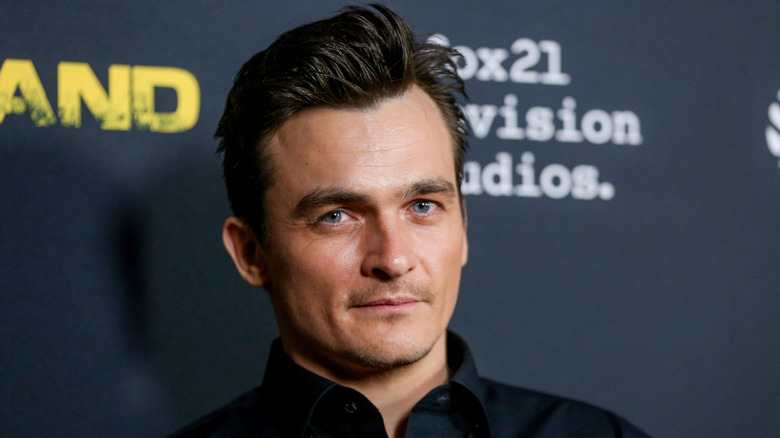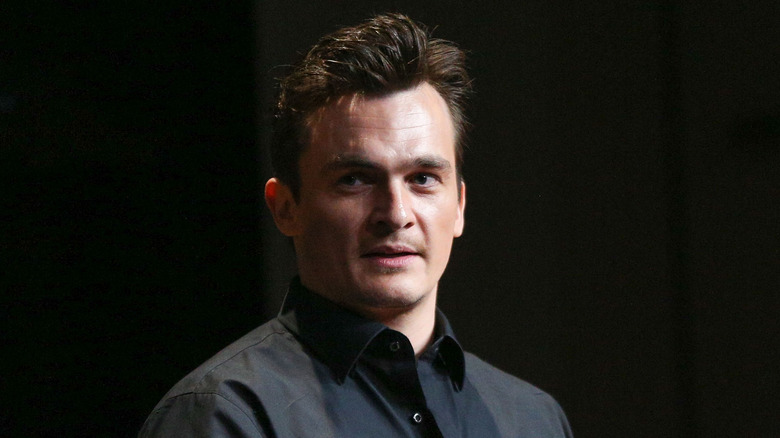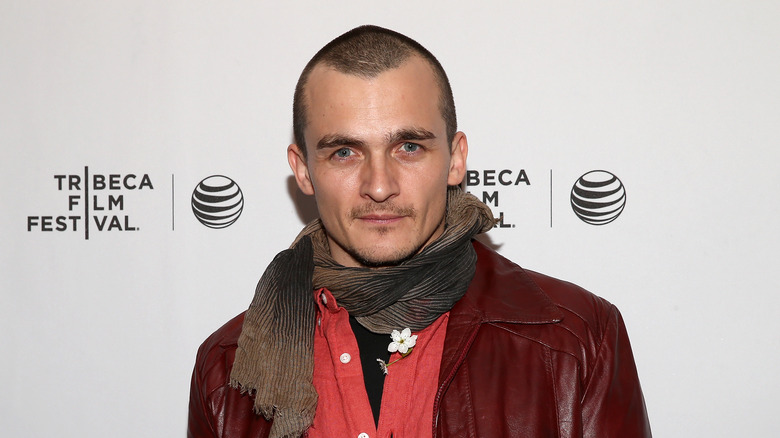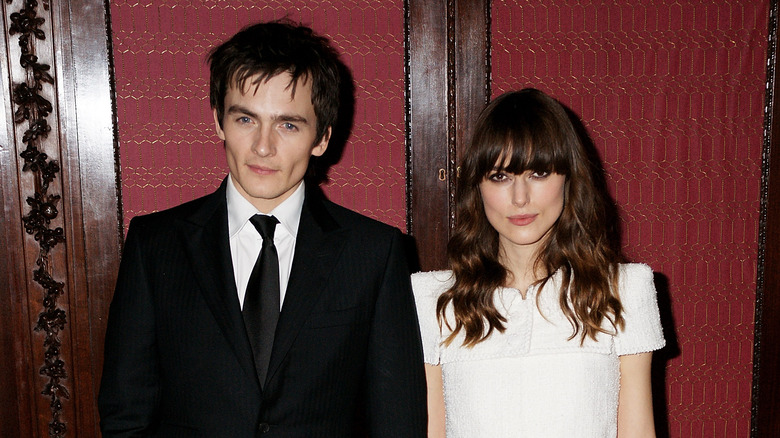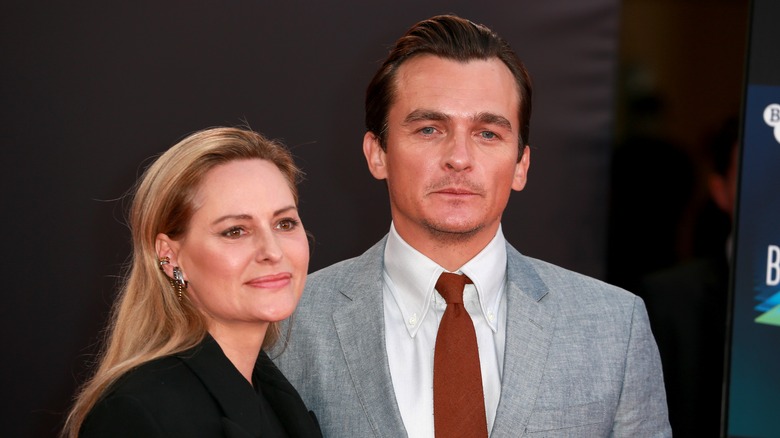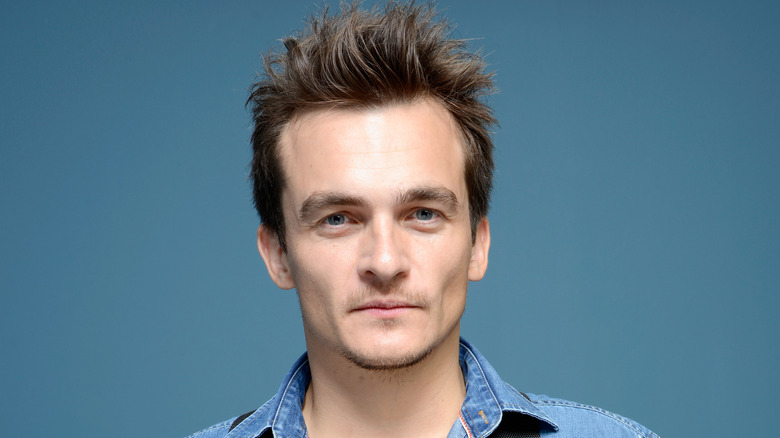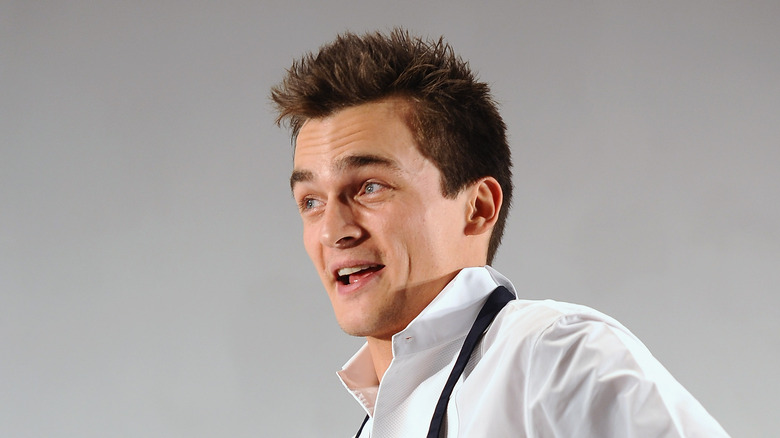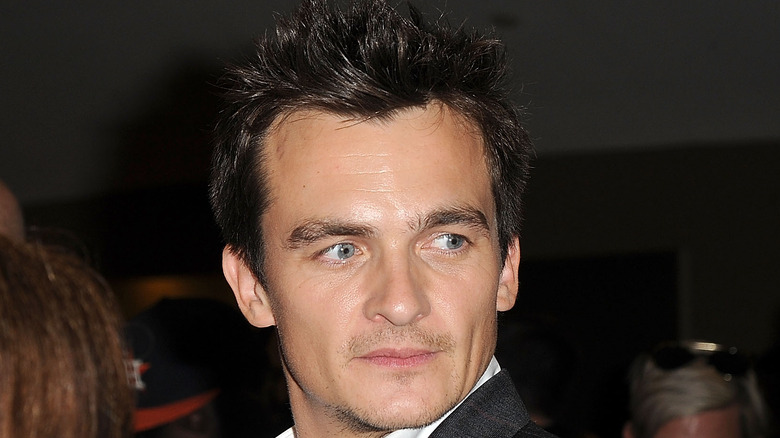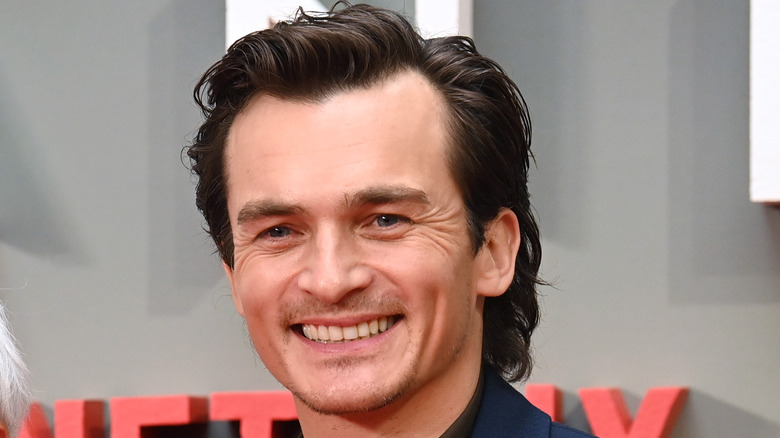The Untold Truth Of Rupert Friend
Rupert Friend is riding high on the success of his latest crowd-pulling release "Anatomy of a Scandal." The miniseries, which unpacks a sexual assault scandal clouding a Tory politician, thundered its way into Netflix in mid-April, dethroning the fan-favorite second season of "Bridgerton" as the most-watched English language series at 75.56 million hours viewed (per Forbes). "The whole series is a conversation-starter for so many different topics," Friend, the show's male lead, told Bustle.
Considering the many acting credits he boasts of today, it comes as a surprise that the Oxfordshire native's quaint countryside upbringing was devoid of cinema. "I didn't have a deprived childhood or anything, but watching movies wasn't something that we did," Friend recalled for Interview. Acting happened when youthful wisdom dictated he should avoid getting caught in a lifelong rut — "I got the 'I don't want the normal job' bug," he told Los Angeles Times.
His oeuvre shows he has diversified into a wide range — from historical period films to action anti-hero roles. At some point in 2022, he will also appear alongside a grand, glittering ensemble cast in Wes Anderson's "Asteroid City" (per Deadline). While the actor kicks off a new decade with exciting stuff on his calendar, let's take a dive into the man behind the name.
Acting wasn't really his dream
Unlike a lot of actors, who claim to grow up enlightened about their intrinsic dream of acting, Rupert Friend segued into Hollywood upon logic. "I didn't have a realization of wanting to be an actor," he admitted to W Magazine. "I had a realization of not wanting to do one thing solely for the rest of my life." An acting job, that would presumably afford him the liberty to dabble in many roles, seemed like the right fit.
Per The Guardian, Friend thus finished high school and enrolled himself at Webber Douglas Academy, a drama school in London that boasts notable alumni like Angela Lansbury and Terence Stamp. By 2004, in his early 20s, Friend landed his first role in the Johnny Depp-starrer "The Libertine." He went on to garner substantial fame a year later as George Wickham in the Regency-era drama "Pride and Prejudice." It set the ball rolling!
However, The Guardian noted that Friend hit a wall of sorts by 2012, feeling unfulfilled and "a bit drifty with it all." It apparently even prompted him to consider quitting: "Maybe the job wasn't right for me and I should stop." Speaking to Den of Geek, Friend said it was a time when he "didn't have any film work" and invested himself in other ventures including, but not limited to, horse whispering — that is, until "Homeland" came knocking on his door.
He dislikes his character from Anatomy of a Scandal
Since the Netflix premiere of "Anatomy of a Scandal" on April 15, the buzzword surrounding the miniseries on social media has been "consent" — and it significantly pivots around the character of Rupert Friend, who plays high-ranking British politician James Whitehouse. He is caught amid allegations of rape and his circumstances have positioned him as an unlikeable figure already — and Friend apparently doesn't disagree. "I didn't want to [take the role] because I didn't like the guy at all, let alone the world in which he moved," he told Tudum. The nuance of his character, he reflected, lay in how he was "convinced of his innocence."
As per Friend, one can see iterations of his Whitehouse character in people holding powerful positions. "There's a hubris in these people who move through the world without accountability for their actions, and it's strengthened every time they get away with something," he told Bustle.
The series, which also stars Sienna Miller and Michelle Dockery, is not based on real people. But Sarah Vaughn's book, on which it is based, does draw inspiration from real life. "Anatomy of a Scandal" creator Melissa James Gibson told Town & Country, "She [Vaughn] went to Oxford and while she's said the story isn't based on anyone in particular, it's certainly based on a milieu—and we tried to take that and run with it."
He was bullied as a child
Rupert Friend hasn't shied away from reflecting on difficult moments from his childhood. The British actor has often touched upon past experiences of being bullied as a young boy. Conversing with Emily Blunt, his co-star in "The Young Victoria," for Interview, Friend revealed that his early years of growing up in rustic Oxfordshire were interspersed with unpleasant times when he was "fought." He explained, "I wouldn't say they were actually fights, because fight implies that there were two people involved, and I don't think I ever managed to successfully hit back."
On occasion, Friend has even elaborated in disturbing detail what peers did to him. "Nothing's as frightening as being held down and having cigarettes put out on you," he told the Sunday Telegraph (via Digital Spy). Friend was bullied for his appearance — haircut and glasses, in particular. Also, "sharing names with a cartoon bear didn't help," he wrote for Oxford Mail. The piece, an obituary Friend wrote for a beloved theatre teacher, further acknowledged how, under her tutelage, he was able to find his safe space as a "heavily bullied" boy and develop an imagination — "the tool I use every single day of my life."
Daniel Day Lewis is his hero
As an actor, Rupert Friend has an elite pack of legacy stars he idolizes. Standing tallest among them is Daniel Day-Lewis. Now retired, Day-Lewis is widely regarded as one of the best actors of his generation to have graced the silver screen. To Friend, he is his ultimate hero. It was apparently Day-Lewis' work that galvanized Friend to take the acting route. "Seeing 'My Left Foot' and then 'Last of the Mohicans' moments later and realizing it was the same person, it's still kind of mind-boggling to me. I still look for that transformative quality in actors," he told W Magazine.
Harrison Ford, meanwhile, brought Friend's fantasy hero to life as Indiana Jones in the first film he ever saw in the cinema, per Interview. "Indiana Jones more than Harrison Ford himself was—and still is—quite a big man-crush of mine. ... But Harrison is a big man-crush, too. He's a very cool guy," he said.
Another industry giant who Friend counts among his earliest "crushes" is the late Marlon Brando, whose genius he first witnessed at only 12 years old in the 1951 film "A Streetcar Named Desire." A nugget of wisdom dropped by Brando, and relayed to Friend by Johnny Depp — "You only have so many faces in your pocket" – has remained with him permanently, per Independent. Depp, too, is regarded by Friend as "one of the greatest screen actors ever."
He is a talented writer
Rupert Friend is a man of many trades! His talents aren't restricted to acting — he also doubles as a writer. Friend penned the words for British band Kairos 4tet's jazz album "Everything We Hold" released in 2013. As told to Little Black Book, one of the musicians was friends with Friend and approached him. But it was something he had never done before. During an interview with Esquire, Friend hinted that he was initially hesitant in wearing the lyricist hat. "It was a great example of someone believing in you and you saying no and them insisting and you say, 'Okay, I'll try,' and then realizing you love it. They loved what I did."
Beyond writing lyrics, Friend has also written for the screen — specifically two short films, 2009's "The Continuing and Lamentable Saga of the Suicide Brothers" and 2010's "Steve" (per IMDb). The latter, which Friend also directed, was a standout and starred his then-partner Keira Knightley as well as Colin Firth and Tom Mison. "Steve" also made it to a star-studded compilation of seven shorts called "Stars in Shorts" that was released in 2012. Per Deadline, Friend is also the writer on the upcoming boxing biopic "Cornerman" starring Bruce Willis.
He finds routine boring
A promise Rupert Friend made early on to himself was not to live in monotony. "That routine thing is not comforting to me. It's the opposite to that. I find it quite unsettling if I'm doing the same thing that I did yesterday," he told The Observer in 2009. The outlet further revealed that Friend enjoyed a nomadic life of sorts — without a fixed home or the usual possessions, like a television. In fact, badgering questions about his future — that the youth are often inundated with — are what prompted him to mull over becoming an actor. He described it as "the only job that I could sort of think about that was different every day and challenged you in different ways every day. ... You didn't have to be a lawyer or an astronaut. You could be both."
Even though his skill as a stage actor is a significant feather in his cap, his penchant for newness has apparently prevented him from sharing too deep a romance with theatre. "I don't love plays. I don't love doing the same thing, every night, for 100 nights in a row," he told The Guardian. His mantra? "New day, next thing!"
He was initially supposed to be a guest role on Homeland
The role that led Rupert Friend to his first Emmy nomination was originally slated to be just a guest appearance. Can you believe it? "When I joined the show I was a guest role and as far as I knew it could have been a one-episode thing or more," Friend told Esquire. "It went from being potentially a pop-up role to something more substantial." Friend's portrayal of CIA assassin Peter Quinn on "Homeland" across five seasons remained a steady fan favorite.
In an interview with Los Angeles Times, Friend described his character as "a fascinating human being" and one as complex as rarely seen on television. "One reason Quinn resonates with people is he ultimately has such agency — and that's incredibly attractive," he said. Attractive as he may have been, Friend's Peter Quinn – spoiler alert! – ultimately met his end in the Season 6 finale — an event that prompted a dramatically frenzied response from fans.
A group of discontented Quinn admirers released a full-page open letter in The Hollywood Reporter in 2017 afterward, asking the makers to address his "unceremonious end." In a statement, showrunner Alex Gansa, expressing empathy with his audience, responded by saying that "Rupert Friend's heart-wrenching performance should speak for itself. ... In my eyes, he died a hero."
People were scared of him when he went bald
A key requisite for Rupert Friend to assume the titular role in the 2015 film "Hitman: Agent 47" was shaving off his head. As gaming connoisseurs would know, the assassin character from the video game franchise (on which the film was based) traditionally sports a bald head. For the British actor, this meant a new experience.
Speaking to Esquire, he admitted that while he "loved the feel of the air on my head," his new look lent him a menacing bearing — which wasn't necessarily a bad thing. "There'd be times where I was driving in Berlin or Singapore where we shot and someone would cut into me dangerously in the traffic," he recalled. When the driver came stomping towards him, Friend said "he took one look, turned around, and got back in his car. I didn't have to do anything."
Ruminating over his "pointy head," he told The Press that there was "an odd lump at the back, which I like to think has some kind of denotation of greater intelligence." Or it may very well have come from him bumping his head around too much. "There's a lot of nicks and scars on it," he added.
He's always avoided discussing Keira Knightley in interviews
For the five years that Rupert Friend and Keira Knightley, co-stars from the 2005 period film "Pride & Prejudice," were together, their relationship was consistently besieged by frenzied media attention. In a 2009 interview with The Observer, which reported on the scrutiny their pairing invited in the press, Friend refused to answer questions related to then-beau Knightley, quipping, "It's private." The couple ultimately split in 2011, with the stress of being celebrities with public lives attributed as one of the reasons behind the breakup (via Hello! magazine).
Friend seems to have held on tight to his rule of never mentioning Knightley in interviews (per Independent), long after the couple called it quits. In a separate report, the outlet indicated that Friend and Knightley "made a pact" to avoid referencing each other in the press, even when they were a thing. In fact, their five years together were burdened with great distaste for the paparazzi and tabloid attention that hounded them. Talking to The Guardian years past the breakup, Friend explained that he found "the idea that everything is for sale" rather discomforting. "That you'll say, 'Come into my home and I'll pretend you're my best friend, even though you're a camera crew,'" he added.
He married Aimee Mullins in a secret ceremony
Rupert Friend stunned his fans and the press when, in June 2016, he made a low-key announcement about being a married man. The British actor, who managed to keep the news of his nuptials successfully under wraps for a whole month, took to Instagram to share a snap with his wife, Aimee Mullins – an ace Paralympics athlete and his longtime girlfriend. "Today is the one-month anniversary of being happily married to @AimeeMullins! #ilovemywife," he wrote, alongside a sweet snap of the two caught in a loving embrace on what People reported was their wedding day.
Appearing on "Live with Kelly and Ryan" a year after marrying Mullins, Friend revealed the couple had eloped. Describing it as the "perfect, perfect wedding," the then-35-year-old said just four people were present at the ceremony on May 1 — Mullins and Friend themselves, and two of their buddies. "We got married in a compost shed at a beautiful farm in the rain — it was the perfect perfect wedding — and then we went and played pool in Manhattan," Friend recalled.
Friend, who met Mullins circa 2012 while shooting "Homeland" and became engaged in 2014, seizes every opportunity he gets to gush over his wife. Besides his adorable Instagram posts for her, he told DuJour, "Aimee's invaluable to me in every way, and is a great help on every one of my projects."
He once made out with Johnny Depp for a role
Rupert Friend made his big-screen debut in 2004 with the period drama "The Libertine." His entry into cinema was demonstrably grand, having begun opposite megastar Johnny Depp, with whom Friend apparently had to share a kiss for the role. "I had to make out with Johnny, mutually masturbate with Johnny, get run through by a pike, and die in front of him. It was such a deep-end baptism by fire," Friend told W Magazine, talking about his experience.
Prior to the release of the film, in which Depp starred as 17th-century poet John Wilmot, there was quite some buzz around an anticipated same-sex kiss he was rumored to be sharing with an industry newcomer. "His name is Rupert Friend and he's a fairly unknown actor but very handsome," a source told Today, calling Friend a "lucky guy." Depp had, by then, emerged to the forefront of Hollywood, having already headlined the first film of the swashbuckler hit franchise "Pirates of the Caribbean" as Captain Jack Sparrow in 2003.
Though Friend and Depp figured as lovers-of-sorts in "The Libertine," their raunchy scenes did not make it to the final cut. As noted by Roger Ebert, the film expresses John Wilmot's bisexuality but "is not as interested in that side of his activities." Friend, in future interviews, would gush about debuting with Depp, whom he called "the greatest teacher ever."
He's actually quite funny
Don't let his violent screen characters deceive you, for Rupert Friend is actually rather funny. And fun! Speaking to The Observer, the British actor — who finds it difficult to be tethered to one thing for a long time — said his personality hopefully doesn't set him up to be a bore. Describing himself, he said he was "f***ing tiring, probably very irritating, frustrating, but not too boring. That would be fine if that was my gravestone: tiring, frustrating, irritating but fun at times."
Even on the sets of his latest thriller release "Anatomy of a Scandal," which is centered around very somber themes, Friend and his compatriots managed to keep the atmosphere light. "It was one of the silliest sets I've ever been on, mostly thanks to Sienna [Miller] and S.J. Clarkson, our wonderful director, who has as good and twisted a sense of humor as we do," he told Collider. Miller, in fact, awarded him the honor of being "irreverent," as quoted by Interview.
For all the fooling around he does, Friend sure would like to be a part of more comedy projects. "The few people who know me and love me know that that's very much the heart of me," he divulged to The Sunday Guardian. "I think I have quite a serious face, which is a shame, because I've got quite a silly side to me."
He was afraid to take on a role in The Boy In The Striped Pajamas
Early on in his career, Rupert Friend diverted from playing harmless characters and donned the Nazi uniform for his 2008 film "The Boy in the Striped Pajamas." In this Holocaust drama that follows the story of two young boys during World War II, Friend played the sinister German officer Lieutenant Kurt Kotler — a role with which he shared a complex relationship. He revealed he was "frightened" about accessing the darker aspects of his character. "How would you do that?" he said, talking to RTE. "It wasn't somewhere that I particularly looked to spend more time necessarily, headspace-wise," he continued saying.
For Friend, slipping into the Nazi uniform alone had an ominous quality to it. "It's a bit like, I suppose, the Batsuit or something. You immediately do feel a sense of, sort of, menace. You can't help it," he reflected in an interview at the London premiere of the film.
A particularly disturbing scene in the film implies that Friend's Kotler is violent towards a young Jewish boy (played by Jack Scanlon, who was 11 at the time, per The Times). Friend explained to RTE that it was important he separate himself from his character off-screen, especially with child actors around. "He [Kotler] came out and then went away. And we tried to make sure that we could enjoy ourselves so that those kids didn't have a miserable time."
He has a short attention span
His aversion to routine was what prodded Rupert Friend towards the world of acting, where he could be a different person everyday via W). Closely linked to this is another aspect of the 40-year-old's disposition, which prevents anything from holding his attention for too long. It's also why he doesn't watch too much television. "I've only actually seen a couple of shows and I didn't finish them — not because I didn't enjoy it but because I think I may have a slightly wandering attention," he told The Wrap. He did manage to begin "Mad Men" and "Breaking Bad," he said, but couldn't find it in him to see them through till the end.
"I get bored quickly. Always have. Short attention span," he explained to The Observer. It seems to be a trait so strong that Friend, in the interview, used it to justify why he turned away from undergraduate college, despite his parents being the University of Oxford alumni. "I didn't like the idea of doing one thing for three years." For the same reason, Friend doesn't prefer theatre, despite being an accomplished stage performer. "I'd do it once ... for one night only," he told Independent.
Well, perhaps this very itch to never settle is what makes Friend so great.
